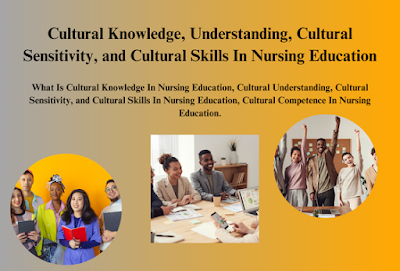The Cultural Knowledge Understanding Cultural Sensitivity and Cultural Skills In Nursing Education. Cultural sensitivity generally refers to the set of knowledge, skills, attitudes, and beliefs that enable people to work well with, respond effectively to, and support others in intercultural settings.
The Cultural Knowledge Understanding Cultural Sensitivity and Cultural Skills In Nursing Education
In nursing education, the development of cultural competence, the understanding of cultural sensitivity, and the development of cultural skills are essential for culturally safe and effective care. Cultural competence involves a comprehensive understanding of different cultures and the ability to apply this knowledge in patient care. Cultural sensitivity means being aware of and respecting the beliefs, values, and practices of different cultures. Cultural skills include the ability to interact effectively with people from different cultures and communicate in a culturally appropriate manner.
Introduction
Cultural Skills In Nursing Education In nursing education, the integration of cultural competence is essential for providing effective, patient-centered care. This article explores the facets of cultural knowledge, understanding, sensitivity, and skills in nursing education, highlighting their importance and offering strategies for fostering these competencies among students and faculty.
What Is Cultural Knowledge in Nursing Education?
Cultural knowledge refers to the accumulation of factual information about various cultural groups. It is a foundational element for both nursing faculty and students, crucial for effective teaching and clinical practice. Faculty can assess students’ cultural knowledge through various assignments and utilize conceptual models to guide learning.
One prominent model is the Transcultural Assessment Model by Giger and Davidhizar (2008), which includes components like communication, time, space, health beliefs, and practices. This model helps students understand cultural differences and apply this knowledge in assessments and interactions. Other influential models include:
- Leininger’s Cultural Care Theory (1993)
- Purnell and Paulanka’s Model for Cultural Competence (2008)
- Campinha-Bacote’s The Process of Cultural Competence in Delivery of Healthcare Services (1999)
These models emphasize understanding cultural heterogeneity rather than assuming homogeneity within ethnic groups. Faculty should encourage students to ask open-ended questions to avoid assumptions and promote a nuanced understanding of cultural diversity.
Cultural Understanding, Sensitivity, and Skills in Nursing Education
Cultural Understanding involves recognizing the diversity of perspectives, truths, and solutions. It requires students to appreciate that no single cultural framework applies universally. To develop cultural understanding, faculty should design activities that encourage students to engage with diverse cultures through case studies, role-playing, and discussions.
Cultural Sensitivity is the ability to respect and value cultural differences. It is often developed through real-life experiences rather than classroom activities alone. Clinical placements in diverse settings and structured reflection sessions can enhance students’ sensitivity to cultural nuances.
Cultural Skills pertain to effective communication and interaction with individuals from different cultural backgrounds. Skill development can be facilitated through role plays, interviews, and analysis of communication techniques. Faculty should provide feedback and opportunities for self-assessment to help students refine these skills.
Cultural Competence in Nursing Education
Cultural competence is the ability to deliver care that respects the cultural beliefs, behaviors, and needs of patients. Faculty members must model cultural competence and understand their own biases to guide students effectively. Definitions of cultural competence include:
- Nunez (2000): The capacity to function effectively within the cultural contexts of various communities.
- Purnell and Paulanka (2008): The awareness of one’s own beliefs while respecting and adapting to patients’ cultural backgrounds.
- Campinha-Bacote, Yahie, and Langenkamp (1996): A continuous process where nurses strive to work effectively within diverse cultural contexts.
Cultural competence is viewed as a developmental journey rather than a final destination. Burchum (2002) identified eight attributes of cultural competence, while Lister (1999) proposed a taxonomy with seven key terms, including cultural awareness, knowledge, understanding, sensitivity, interaction, skill, and competence.
Wells (2000) suggested a model with two phases: cognitive (knowledge acquisition) and affective (attitudinal and behavioral changes). This model highlights the progression from limited knowledge to cultural proficiency, with each stage building on the previous one.
Conclusion
Achieving cultural competence in nursing education requires a comprehensive approach, integrating knowledge, understanding, sensitivity, and skills. Faculty should design curricula and activities that address these components, ensuring that students develop the ability to provide culturally competent care. By emphasizing continuous learning and self-assessment, nursing programs can prepare graduates to meet the diverse needs of their patients effectively.
Cultural Knowledge Understanding Cultural Sensitivity and Cultural Skills In Nursing Education
Cultural Knowledge Understanding Cultural Sensitivity and Cultural Skills In Nursing Education
Cultural Knowledge Understanding Cultural Sensitivity and Cultural Skills In Nursing Education
Read More:
https://nurseseducator.com/didactic-and-dialectic-teaching-rationale-for-team-based-learning/
https://nurseseducator.com/high-fidelity-simulation-use-in-nursing-education/
First NCLEX Exam Center In Pakistan From Lahore (Mall of Lahore) to the Global Nursing
Categories of Journals: W, X, Y and Z Category Journal In Nursing Education
AI in Healthcare Content Creation: A Double-Edged Sword and Scary
Social Links:
https://www.facebook.com/nurseseducator/
https://www.instagram.com/nurseseducator/
https://www.pinterest.com/NursesEducator/
https://www.linkedin.com/in/nurseseducator/
https://www.researchgate.net/profile/Afza-Lal-Din
https://scholar.google.com/citations?hl=en&user=F0XY9vQAAAAJ

I’m extremely impressed together with your writing abilities as smartly as with the layout on your weblog. Is this a paid theme or did you customize it yourself? Either way stay up the nice quality writing, it is rare to look a nice blog like this one today!
Thank you for sharing your thoughts. I truly appreciate your
efforts and I am waiting for your further post thanks once
again.
my site :: nordvpn coupons inspiresensation (tinyurl.com)